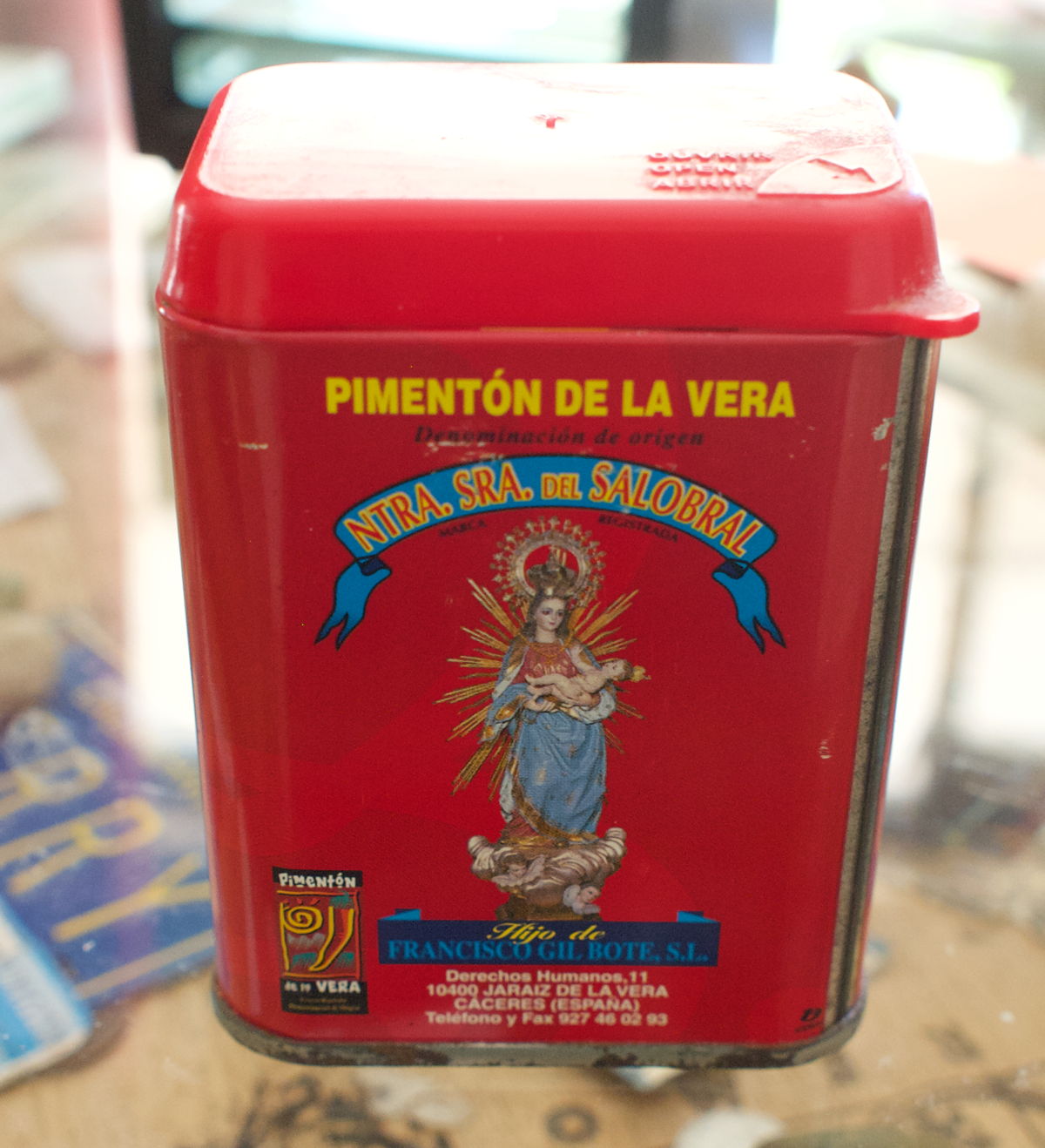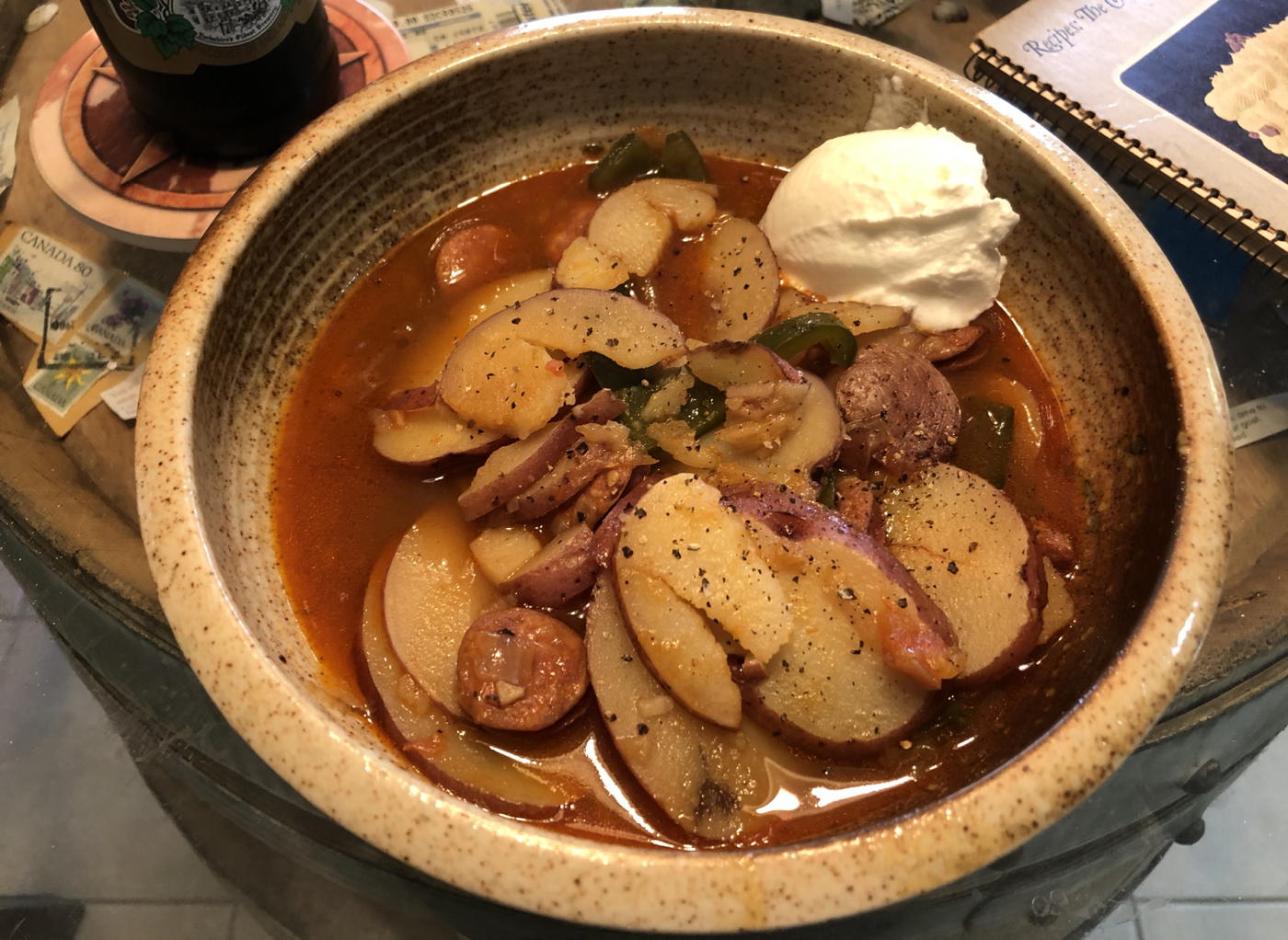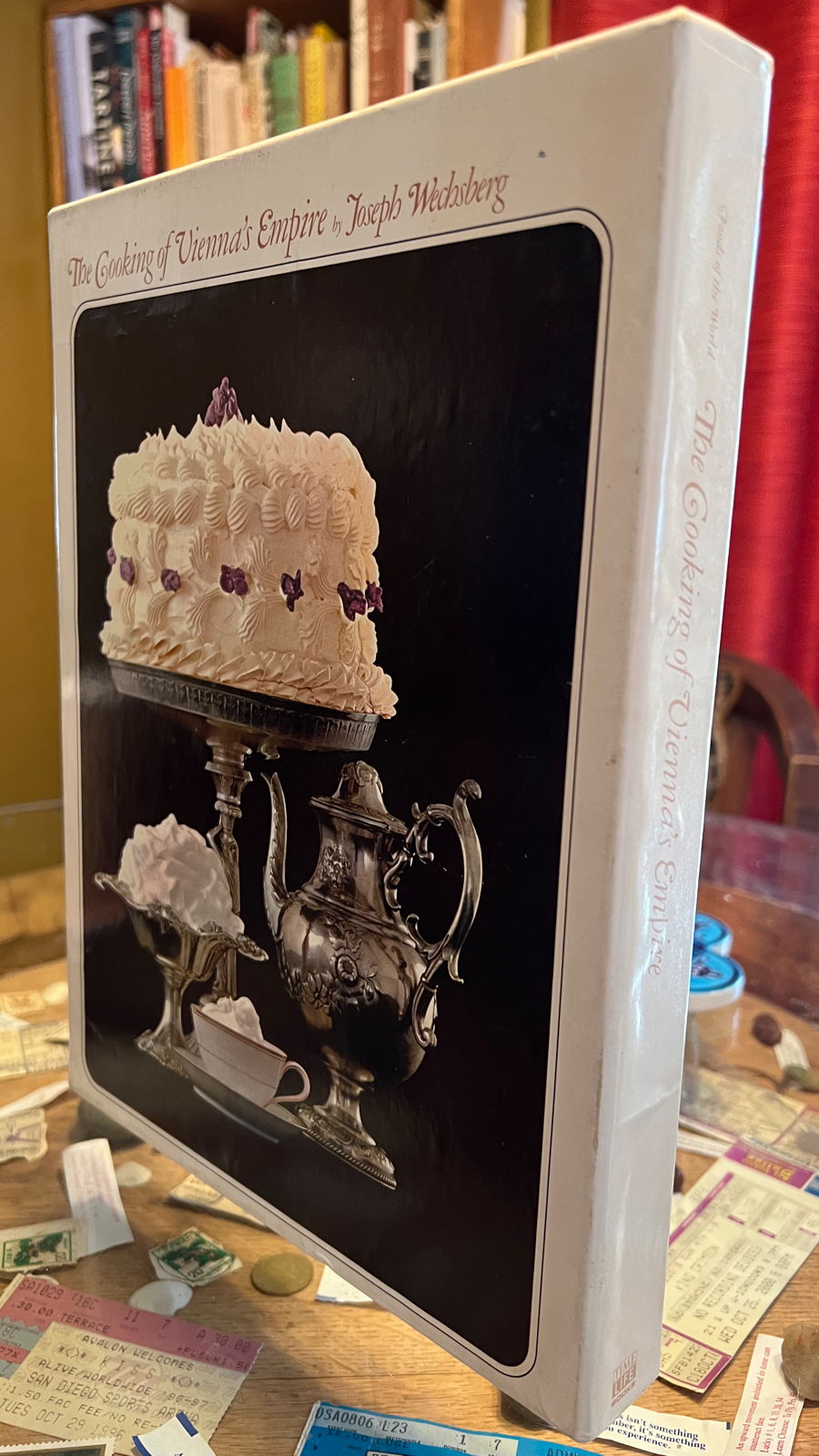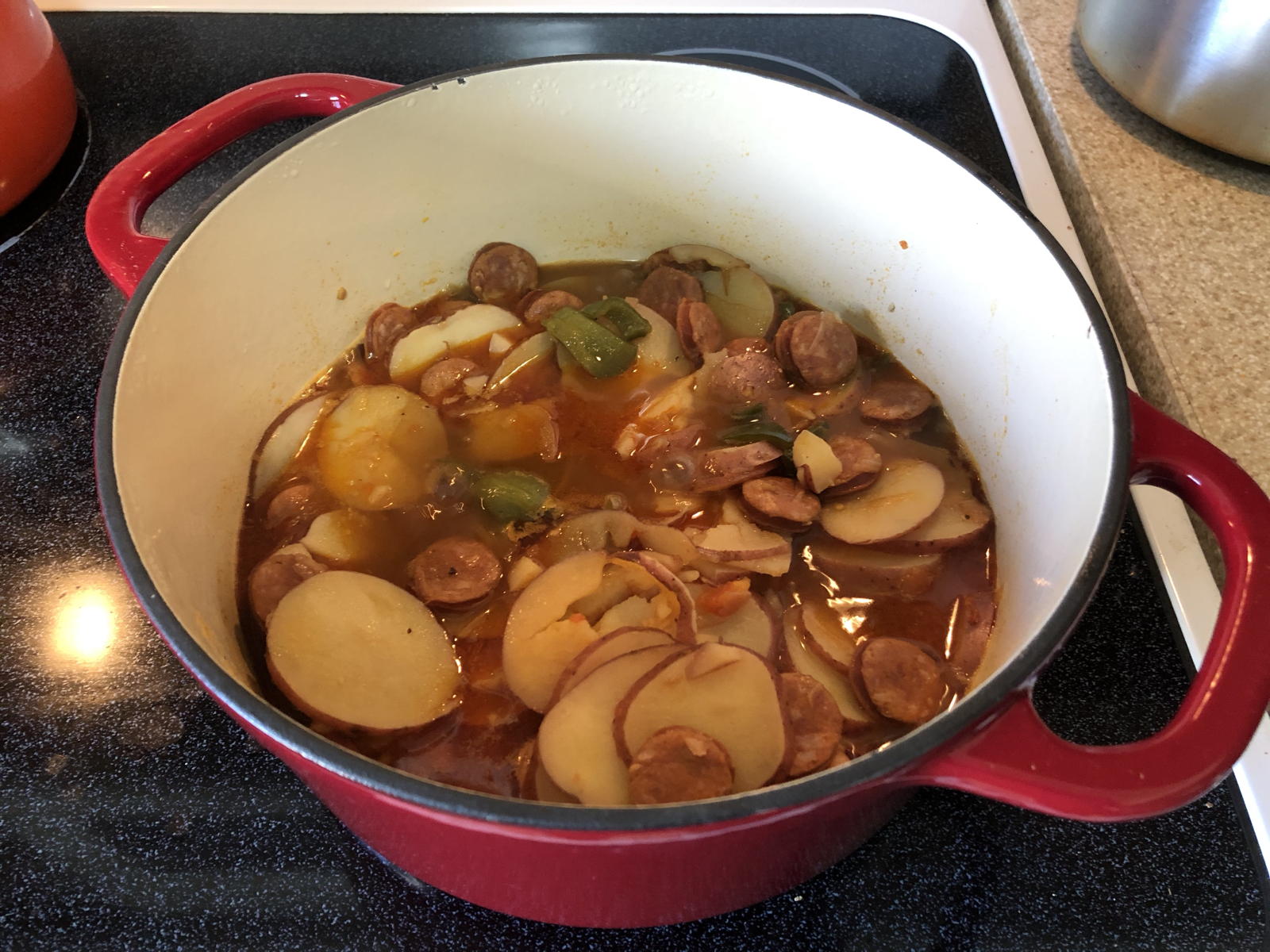Paprikás Burgonya (Potato Paprika Stew)
Friday is National Potato Day. Why not try this very easy potato-sausage stew from Hungary? You can make it in an hour on the stovetop, or start it up in the morning in a crockpot.
Servings: 8
Preparation Time: 8 minutes
The Cooking of Vienna’s Empire•
The Cooking of Vienna’s Empire
Ingredients
- 2 lbs potatoes
- 1 lb Hungarian (semisoft smoked) sausage, sliced
- 3 tbsp lard or bacon grease
- ⅔ cup finely chopped onion
- ¼ tsp finely chopped garlic
- 1 tbsp smoked paprika
- 2 cups chicken or beef stock
- ⅛ tsp caraway seeds
- 1 medium tomato, puréed
- 1 red bell pepper, finely chopped
- 1 tsp salt
- pinch of black pepper
- ½ cup Greek yogurt
Steps
- Cook the potatoes in boiling water for 8-10 minutes. Then cut into ¼-inch slices.
- In a 4-quart saucepan or casserole, heat the lard until a light haze forms over it, then add the onions and garlic and cook for 8-10 minutes until lightly colored.
- Remove from heat and stir in the paprika until the onions are well-coated.
- Return to heat and add the stock. Bring to a boil.
- Add the caraway seeds, potatoes, sausage, tomato, bell pepper, salt, and black pepper.
- Return to a boil, stir, cover, and simmer for 25-30 minutes until the potatoes are tender.
- Serve topped with a tablespoon of Greek yogurt.
Clearly, paprika is an ingredient that has to be well understood for best results… Pseudo-knowledge is widespread and increases with the distance from Budapest. — Joseph Wechsberg (The Cooking of Vienna’s Empire)
The Cooking of Vienna’s Empire is the first of the Time-Life Foods of the World cookbooks I discovered. That was back in 1999, at the San Diego (Adams Avenue) Book Fair, for $0.25. It was a beat-up copy. I ended up buying a lot more books from this series than I should have, because Joseph Wechsberg’s writing about Vienna, Hungary, Czechoslovakia, and Yugoslavia are so interesting, the photos are wonderful, and the recipes are great. This is one of the better books in the series; many don’t live up to this one.
The very first recipe I tried from his book was Paprikás Burgonya. It is a great recipe for a Friday-falling National Potato Day. Start it in the morning in the crock-pot and eat it at night. Or whip it up quickly on the stove-top.
One of the things that made this stew so good when I first made it is that a friend of mine had brought me some “pimentón de la vera” from Spain. I had no idea what that meant, other than that it was paprika. But it was so much better than normal paprika I despaired of ever making any paprika-based dishes after this ran out. Eventually, with the onset of Internet search engines, I discovered that “pimentón de la vera” is a smoked paprika, and is easily, if not universally, available at grocery stores in the United States as smoked paprika. It may not be up to the level of smoked paprika from Spain, but it still vastly improves just about any dish that calls for paprika.

You’ll probably have to travel to Spain to get this particular brand of paprika, but smoked paprika is generally available in modern groceries. H-E-B in Texas often has it in the bulk spice section.
If you don’t have smoked paprika, just use sweet paprika—it’s what the original calls for, though of course the original calls for Hungarian sweet paprika.
Apropos of National Potato Day, the potato may be older in the Austrian empire than in Ireland—several sites that I do not trust, because they look like spam sites, assert that potatoes arrived in Austria in 1588, but didn’t reach Ireland until 1588 or 1589, depending on whether you believe the legend about potatoes from the Spanish Armada washing ashore in the earlier year.
This recipe, however, is from the Hungarian section of the cookbook. The introduction of the potato, if 1588 is to be believed, predates the Austrian Empire. Hungary was its own kingdom, so it may not have had the potato before Ireland.
Nor did it have paprika in 1588, according to Wechsberg, but once introduced it became “the foundation of modern Hungarian cooking… lard, onions, and paprika”.
The irony is that with all the association in everyone’s mind between paprika and Hungarian cookery, the fiery plant is not native to Hungary at all… Some authorities believe the invading Turks brought in paprika along with other Oriental spices… The great Hungarian restaurateur Karoly Gundel believes that paprika was brought to Europe from America, and George Lang, an expert’s expert, writes “We are sure of only one thing—before Columbus’ voyages, paprika was unknown in Europe.
Wechsberg also writes that their favorite ingredient is “rich sour cream”, which is what the original recipe calls for adding a dollop of at the end. I don’t normally keep sour cream on hand, so I’ve always used Greek yogurt—when I add a dollop of anything. This is a great stew without any dairy additive, especially if accompanied by a good dark bread and beer.
I use bacon grease more often than lard with this recipe. While the original calls for lard, Wechsberg also writes elsewhere in the book that “Hungarian cooks… often use a mixture of lard and bacon.” Bacon grease handles that perfectly.
The recipe recommends adding a Hungarian sausage. It’s not necessary, but it really brings the stew up a notch. When I first made it, I bought all my sausages from the wonderful and sadly long-gone Sausage King of San Diego.1 They didn’t have any Hungarian sausage, but recommended linguiça as a substitute. It always worked well. But any semi-soft smoked sausage that you enjoy should be fine. I usually use Polish sausage now that I can’t easily get fresh-made linguiça. I suspect that any sausage descended from the countries of the vague circle around Poland, Czechia, Austria, Hungary, and Slovakia will be best. If you have a source for Hungarian sausages, ask for Debreceni sausage.
When I make this in a crock-pot, I don’t bother to boil the potatoes before slicing them. I sometimes drop the stock to a cup or so, because slow-cooking preserves more liquid, but usually just use a full can (which is about 1-¾ cup). I mix everything together at one time and cook on low for 8-10 hours. You will still want to sauté the onions in the lard first to partially caramelize it. This does mean that if you don’t boil the potatoes and sauté the onions at the same time using different pans, making it on the stovetop will require one pan, but the slow cooker will require a pan and a crock.
In response to Buttery foil-baked potatoes for National Potato Day: National Potato Day is tomorrow. And it’s a great day to grill. Here’s a simple foil-wrapped potato and onion recipe for the grill or the oven.
Unrelated to the Sausage King of Chicago.
↑
- The Cooking of Vienna’s Empire
- Review of The Cooking of Vienna’s Empire, with a recipe for Cold Sour Cherry Soup.
- How did the potato get to Ireland?: Sarah Woodbury
- “One of those anachronisms that can trip up an author of medieval fiction is the nature of medieval food. In particular, the potato, a ubiquitous British food these days, comes from the ‘New World’ and didn’t arrive in Britain until after the Spanish conquest.”
- Sausage King: A Taste of the Mother Country in Mission Hills: Caron Golden
- “Sausage King has been in business for 44 years. Long a partnership between sausage master Fred Spenner, a native of Kassel, Germany, and John Krodel, a Wurstmacher from Bamberg, Germany, who died just over a year ago, Sausage King has provided local customers with the flavors of the mother country… The store is the essence of the anti-hip, a throwback to a long ago time of Formica floors and bulky steel cash registers that required strong fingers to press down recalcitrant number keys.The shop is small and dark, definitely in need of a fresh coat of paint, but lush in the aroma of smoked meat.”
More National Potato Day
- Whitegate Garlic Potatoes for National Potato Day
- Elegant garlicky potatoes from Ireland, perfect for your Potato Day celebrations on the nineteenth.
- Jalapeño Potato Chip Cookies
- Potato chip cookies are amazing—crunchy and flavorful—and they’re even better made with kettle-style jalapeño chips! Potato chip cookies are a great way to celebrate National Potato Day.
- Oktoberfest Sauerkraut for Potato Day
- This simple sauerkraut casserole turns into an amazing National Potato Day treat when topped with mashed potato.
- Buttery foil-baked potatoes for National Potato Day
- National Potato Day is tomorrow. And it’s a great day to grill. Here’s a simple foil-wrapped potato and onion recipe for the grill or the oven.
More potatoes
- Oktoberfest Sauerkraut for Potato Day
- This simple sauerkraut casserole turns into an amazing National Potato Day treat when topped with mashed potato.
- Buttery foil-baked potatoes for National Potato Day
- National Potato Day is tomorrow. And it’s a great day to grill. Here’s a simple foil-wrapped potato and onion recipe for the grill or the oven.
- Mint-garlic potato salad
- How to make potato salad even better? Fry the potatoes instead of boiling them.
- Falafel-potato casserole
- This is an easy au-gratin-style potato dish topped with moderately spicy falafel “meatballs”.
- Fried potato salad
- This untraditional salad makes a great choice for when you want something different and moderately exotic at a potluck but don’t want to stand out by making something healthy.
- One more page with the topic potatoes, and other related pages
More soups and stews
- Pumpkin rarebit soup
- Pumpkin rarebit soup from Mollie Katzen’s Enchanted Broccoli Forest is a very nice way to use up those pumpkin parts after carving your pumpkin.
- Cream of coconut jack-o-lantern soup
- If last year’s jack-o-lantern soup wasn’t gruesome enough, try mixing your pumpkin’s disgouged facial parts with coconut and ginger.
- Cream of Jack-o-Lantern soup
- Use the body parts of your hallowe’en pumpkin to make a tasty, if disconcerting, pumpkin soup.
- Corn and spinach tofu soup
- This is a very comforting light soup that makes good use of tofu’s texture and flavor.
- Persian eggplant stew
- This recipe convinced me not to skin eggplants. I almost never take the skin off of eggplants now; it adds a tangy flavor to the eggplant that it otherwise loses.
- 14 more pages with the topic soups and stews, and other related pages



